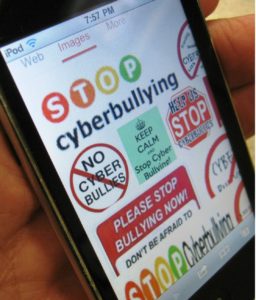Cyberbullying – what parents should know
As parents it’s our job to help our children develop into independent, confident, and self-assured young adults. The pressures and complexities of being a teen, and being the parent of a teen, couldn’t be more challenging. It’s hard enough for kids to find their place in the physical world and try to fit in, but the cyber world has added a whole new layer of concerns.
Cyberbullying is bullying that takes place using digital technology. Cyberbullying most commonly involves the use of cell phones, but may also involve computers, tablets, iPods, gaming consoles and just about any device that connects to the “cyber” world. The actually bullying is facilitated through websites and applications such as Facebook, Instagram, Twitter, Tumblr, Snapchat, and Kik Messenger. Common examples of cyberbullying include mean and threatening text messages, rumors sent by email or posted on social networking sites, and embarrassing pictures, videos, websites, or fake profiles.
Twitter, Tumblr, Snapchat, and Kik Messenger. Common examples of cyberbullying include mean and threatening text messages, rumors sent by email or posted on social networking sites, and embarrassing pictures, videos, websites, or fake profiles.
Digital technology is not to blame for cyberbullying. In fact, digital technology and the power of the Internet have a very positive impact on learning, sharing of ideas, problem solving and staying appropriately connected with friends and family. But these tools can also be used to hurt other people. Whether done in person or through technology, the effects of bullying are the same. According to the US Department of Justice, kids who are bullied are more likely to use drugs and alcohol, have poor grades, skip school, have more health problems associated with the stress, avoid attending school, church, and social functions, and have lower self-esteem.
 So what should you do as a parent to help reduce the risks of cyberbullying? The most important thing to do is talk with your kids about cyberbullying and other online issues regularly. You should also regularly look for opportunities to model and teach empathy. When we help our kids put themselves in another person’s shoes, they learn to be more sensitive to what that person is experiencing and are less likely to tease or bully them. By explicitly teaching our kids to be more conscious of other people’s feelings, we can create a more accepting and respectful community. Learn more at www.StopBullying.gov
So what should you do as a parent to help reduce the risks of cyberbullying? The most important thing to do is talk with your kids about cyberbullying and other online issues regularly. You should also regularly look for opportunities to model and teach empathy. When we help our kids put themselves in another person’s shoes, they learn to be more sensitive to what that person is experiencing and are less likely to tease or bully them. By explicitly teaching our kids to be more conscious of other people’s feelings, we can create a more accepting and respectful community. Learn more at www.StopBullying.gov

